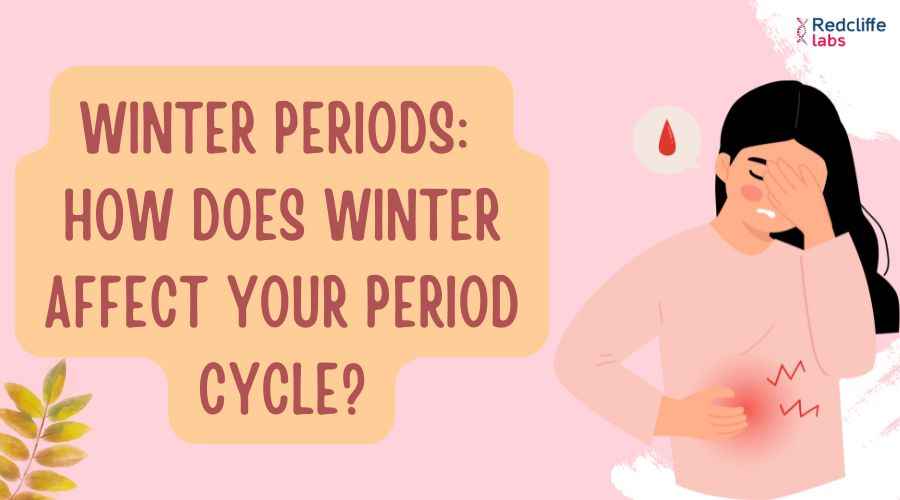Winter Periods: How Does Winter Affect your Period Cycle?

Medically Reviewed By
Dr. Geetanjali Gupta
Written By Sheena Mehta
on Jan 10, 2025
Last Edit Made By Sheena Mehta
on Jul 19, 2025

Have you ever noticed a change in your period cycle with the arrival of winter?
Heavy bleeding, severe cramps, excessive pain, and even longer periods or irregular cycles are common in winter. Colder days are likely to compress blood vessels.
Did you know?
A 2011 newspaper article mentioned that winters can affect the length of menstrual cycles. Menstrual cycles are 0.9 days shorter during summer than in winter.
Additionally, winters also affect your mood with menstruation, making it an exhaustive affair.
As winter 2025 has already set in, and the period is impending for you and many women, here is a blog that sheds light on how winter affects menstruation. Let’s discover it in detail.
6 Winter Period Effects: You May Like to Know
Any change in season not only impacts the weather but also changes your menstrual cycle. Chilly temperatures and shorter days can influence your menstrual health; from irregular periods to intensified premenstrual symptoms, winters affect your period.
1. Hormonal changes in winter
Your body responds to seasonal shifts through changes in hormonal balance. Decreased sunlight exposure reduces the production of neurotransmitters that affect mood. Simultaneously, longer nights increase melatonin (a sleep hormone) levels. Consequently, these hormone fluctuations can impact estrogen and progesterone, which regulate the menstrual cycle.
2. Impact on period regularity
Due to winters, it is less likely to predict periods. Common causes include reduced physical activity, winter stressors such as seasonal affective disorders (SAD), or fatigue. Besides, the weak immune system during winter makes the body more susceptible to infections and stress, disrupting menstrual cycles.
3. Menstrual cramps
Women often complain about intensified menstrual cramps during winter. This is mainly due to vasoconstriction, in which blood vessels respond narrowly to cold temperatures.
Conversely, cold weather can slow uterine blood flow, leading to painful periods. Moreover, colder weather causes muscle stiffness, leading to more severe cramps.
4. PMS symptoms in winter
Premenstrual syndrome (PMS) symptoms can also worsen the menstrual symptoms. These may include mood swings, fatigue, and intense food cravings that occur due to:
- Limited sunshine: Lack of sunlight leads to vitamin D deficiency and decreased serotonin levels, making people feel irritable and highly emotionally sensitive.
- Trigger cravings: During colder months, you tend to crave foods that are high in calories and contain sugar, resulting in bloating and irritability associated with PMS.
5. Seasonal affective disorder (SAD)
A seasonal affective disorder (SAD) is a type of depression associated with seasonal changes. Common symptoms associated with SAD are low energy, persistently low mood, lethargy, abdominal pain, and difficulty concentrating.
6. Changes in menstrual flow
Cold weather during winter also affects your period flow. Therefore, it is very common for women to experience heavier or prolonged bleeding or notice lighter periods. Variations in women's periods mainly come from metabolic slowdown and dietary changes. Let’s discover them in detail.
- Metabolic slowdown: During winter, the metabolic rate slows, influencing uterine contractions and blood flow.
- Dietary changes: Not eating a balanced diet or missing out on essential nutrients, such as iron-rich foods during winter, can affect overall health, including menstrual health.
How can you manage period health in winter?
By now, you must have adopted techniques to help you manage winter-period troubles. It is essential to maintain your menstrual health during colder seasons to help you avoid discomfort and reduce troubles:
- Stay warm: Keep your abdominal area warm. Use heating pads or warm clothing to relax the vessels.
- Take warm showers: A menstruator (you) can take warm baths or hot showers to relieve pain and feel relaxed.
- Hydration: It is important to stay hydrated during winter, especially during your period, to combat bloating and promote overall health.
- Exercise lightly: Avoid strenuous exercise during periods to avoid extreme discomfort. Instead, exercise lightly, under the guidance of experts, to help relieve pain. Additionally, practicing yoga can also help reduce period pain.
- Eat balanced meals: To strengthen your immunity, incorporate seasonal fruits such as oranges, carrots, sweet potatoes, and others that suit your taste and preferences into your diet.
- Take Supplements if Needed: Exposure to sunlight is vital and a natural way to improve vitamin D levels. However, if you are not getting enough vitamin D from sun exposure, discuss it with your doctor, who might suggest taking supplements.
When to see a doctor?
Certain signs warrant you need not delay and visit a doctor immediately when experiencing some changes in your menstrual cycle during winter:
- If your period cycle consistently lasts longer than 7 days. This condition is called menorrhagia.
- If your period’s bleeding is heavy and soaked less than every 1 or 2 hours.
- Severe menstrual cramps due to which you are unable to do your daily chores.
- If you miss periods during winter without a clear cause.
Conclusion
Undeniably, the chilly winters can subtly affect your menstrual cycle. Understanding these effects and proactive steps is vital to managing your period health.
Keep your body warm, maintain a balanced lifestyle, and discuss your concerns with your healthcare provider to ensure winter doesn’t disbalance your menstrual well-being.



